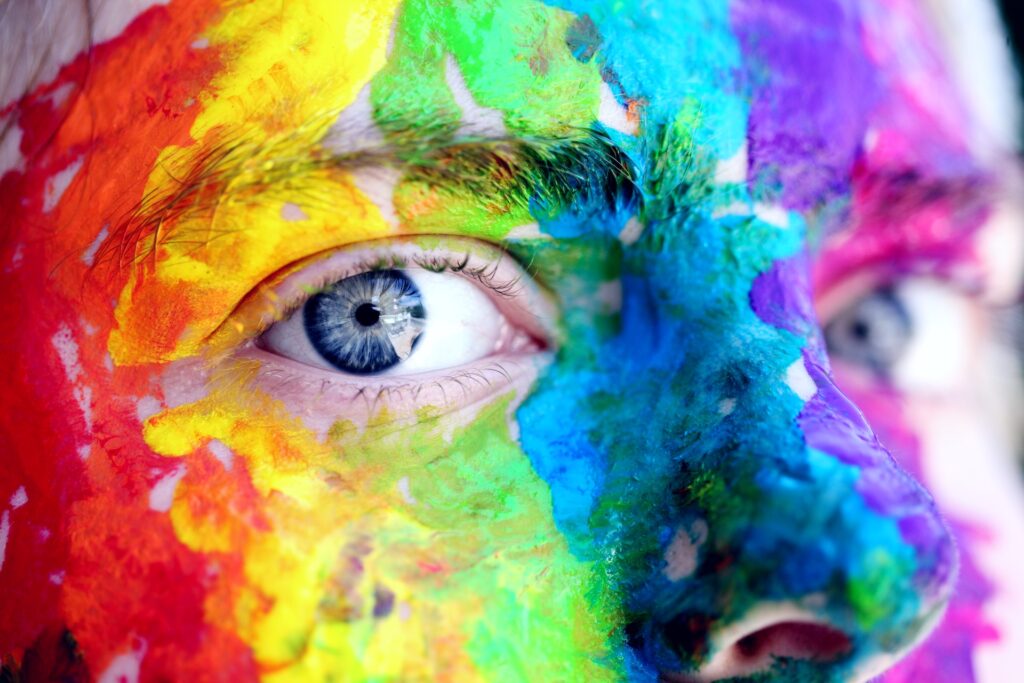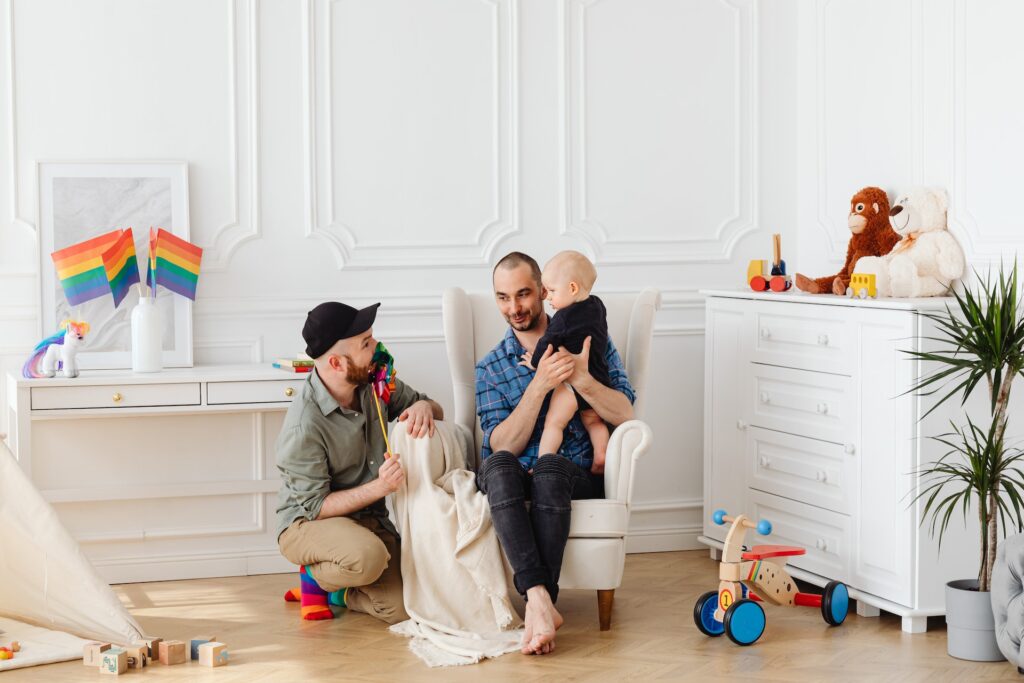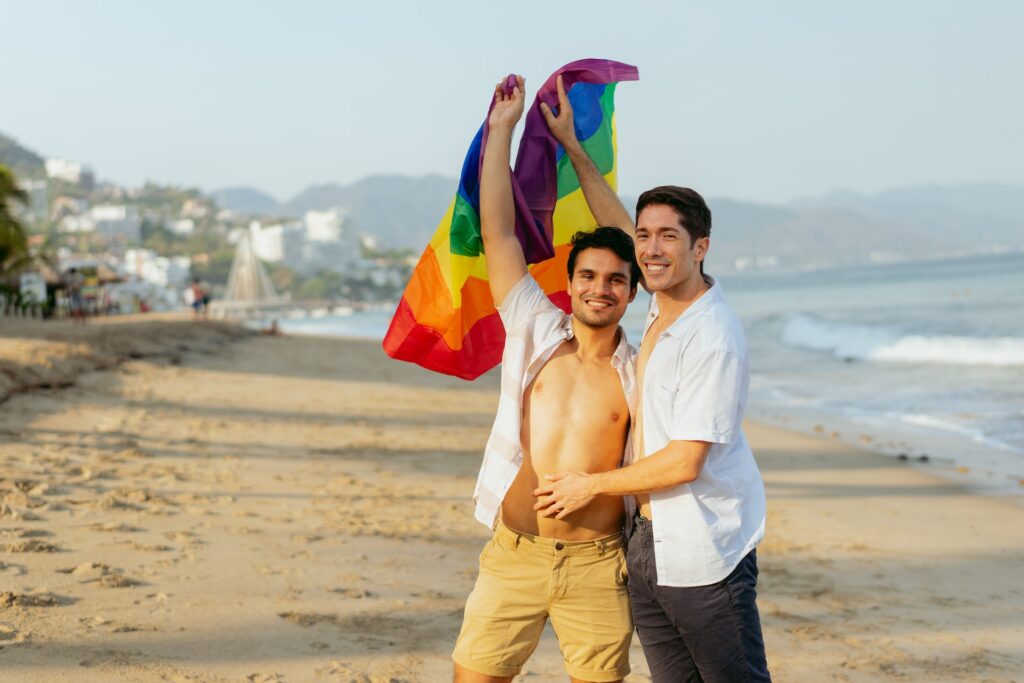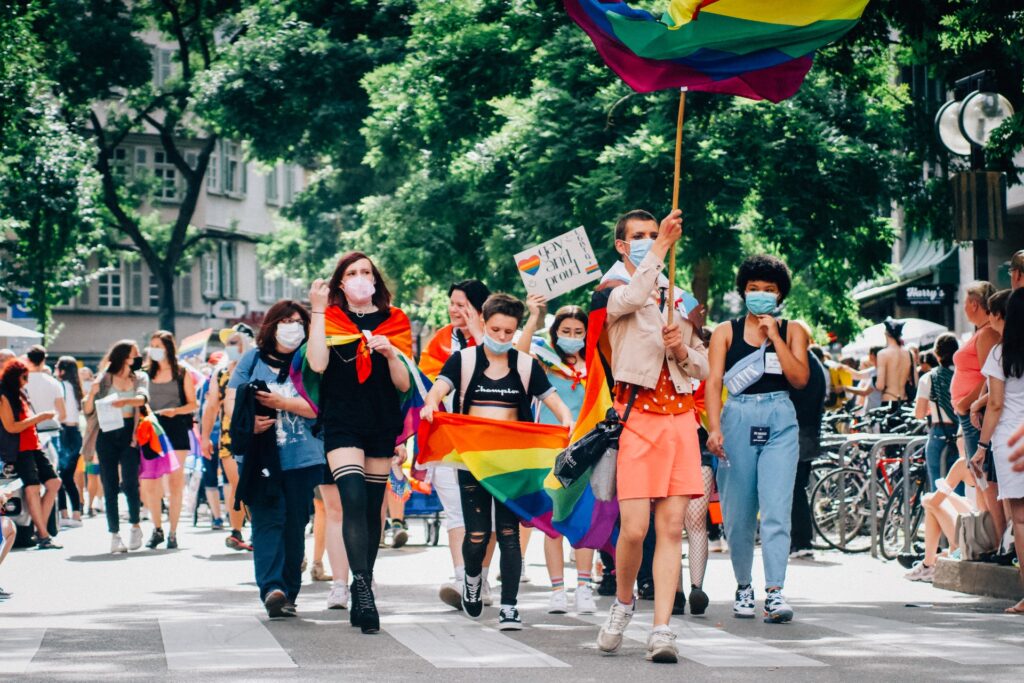Portugal is generally considered a gay-friendly country, and it has been ranked as one of the most LGBT-friendly countries in the world.
In fact, Portugal was the eighth country in the world to legalize same-sex marriage in 2010.
Additionally, the country has several laws in place that protect the rights of LGBT individuals and ensure their equal treatment under the law.
In terms of expats, Portugal is also known to be a welcoming country for foreigners in general, regardless of their sexual orientation.
The country has a large expat community, particularly in cities like Lisbon and Porto, and many of the locals are open and accepting of people from diverse backgrounds.
Of course, like any country, there may be pockets of intolerance or discrimination towards LGBT individuals in Portugal, but overall, the country is considered to be very gay-friendly and a welcoming place for expats.

LGBT rights milestones in Portugal
1984 – Decriminalization of homosexuality
Portugal decriminalized homosexuality, removing legal penalties for consensual same-sex relations between adults.
2001 – Recognition of stable unions
Portugal recognized the stable union of same-sex couples by law, providing legal recognition and rights to these relationships.
2003 – Labor code protection
The Portuguese labor code was amended to protect gay workers from discrimination, ensuring equal rights and opportunities in the workplace.
2004 – Constitutional recognition of sexual orientation
The Portuguese Constitution explicitly recognized sexual orientation as a protected characteristic, emphasizing equality and non-discrimination.
2007 – Criminal code protections
The Portuguese criminal code was amended to provide legal protections for homosexuals, specifically addressing discrimination and physical offenses based on sexual orientation.
2010 – Same-sex marriage legalized
Portugal took a significant step forward by legalizing same-sex marriage, granting same-sex couples the same rights and responsibilities as opposite-sex couples.
2011 – Gender identity recognition
Transgender individuals were granted the right to change their legal gender on official identity documents, allowing them to align their legal recognition with their gender identity.
2016 – Adoption rights for same-sex couples
Portuguese law was revised to permit same-sex couples to adopt children, recognizing their ability to provide loving and stable homes for children.

Same-sex marriage rights in Portugal
Same-sex marriage has been legal in Portugal since 2010, which means that LGBT couples have the same legal rights and protections as opposite-sex couples when it comes to marriage and family. Here are some of the key family rights for LGBT couples in Portugal:
Adoption rights for same-sex couples in Portugal
Same-sex couples in Portugal have the right to adopt children, both individually and jointly. This was legalized in 2007, several years before same-sex marriage was legalized.
Fertility treatments for LGBT couples in Portugal
Same-sex couples in Portugal also have access to fertility treatments, such as in vitro fertilization (IVF) and artificial insemination. This is regulated by law and is available to both opposite-sex and same-sex couples.
Parental leave for gay couples in Portugal
Same-sex couples who have children are entitled to the same parental leave as opposite-sex couples. This includes paid leave for the birth or adoption of a child, as well as unpaid leave for up to six months to care for a child.
Divorce and separation for LGBT couples
Same-sex couples who are married in Portugal have the same legal rights and protections when it comes to divorce and separation as opposite-sex couples.
This includes the division of property and assets, as well as issues related to child custody and support.

LGBT organizations in Portugal
There are several institutions and organizations in Portugal that focus on promoting the rights and well-being of the LGBT community. Here are a few examples:
ILGA Portugal
ILGA is the International Lesbian, Gay, Bisexual, Trans and Intersex advocacy organization in Portugal that works to promote the rights of the LGBT+ community in Portugal. It was founded in 1995 and is a member of the International Lesbian, Gay, Bisexual, Trans and Intersex Association (ILGA) – a global federation of LGBT+ rights organizations.
ILGA Portugal advocates for LGBT+ rights through public education, lobbying, and community outreach. It also provides a variety of support services, including legal advice, counseling, and community events.
Clube Safo
Clube Safo is a well-known LGBT+ nightclub located in Lisbon. It was founded in 1986 and is one of the oldest LGBT+ bars in Portugal.
The club is known for its vibrant atmosphere and diverse clientele, and has become a popular destination for LGBT+ visitors to Lisbon. It hosts regular events and parties, including drag shows, dance parties, and live music.
Opus Diversidades (Formerly Opus Gay)
Opus Diversidades is a support and advocacy organization for LGBT+ people in Portugal. It was founded in 1999 as Opus Gay and changed its name to Opus Diversidades in 2021 to reflect its broader focus on diversity and inclusivity.
The organization provides a variety of services, including counseling, legal advice, and community outreach. It also hosts regular events and activities for members of the LGBT+ community, including support groups and cultural events.
Transmissão
Transmissão is a non-profit organization that works to promote the rights and wellbeing of trans and non-binary people in Portugal. It was founded in 2013 and provides a variety of support services, including counseling, legal assistance, and social activities.
The organization advocates for the rights of trans and non-binary people through public education and community outreach. It also provides training for healthcare professionals and other service providers to improve the quality of care for trans and non-binary individuals.
Casa T Lisboa
Casa T Lisboa is a community center for transgender and non-binary people located in Lisbon. It was founded in 2017 and provides a safe and welcoming space for members of the community.
The center offers a variety of support services, including counseling, legal advice, and medical referrals. It also hosts regular social events and activities, including art exhibits, film screenings, and support groups.
Casa Qui
Casa Qui is a non-profit organization that works to promote the rights and wellbeing of LGBT+ refugees and asylum seekers in Portugal.
It was founded in 2016 and provides a variety of support services, including legal assistance, counseling, and social activities.
The organization advocates for the rights of LGBT+ refugees and asylum seekers through public education and community outreach. It also provides training for service providers to improve the quality of care for LGBT+ refugees and asylum seekers.
Panteras Rosa
Panteras Rosa is a well-known LGBT+ advocacy group in Portugal that was founded in 1976. It is one of the oldest LGBT+ rights organizations in Portugal and has been instrumental in promoting the rights of the LGBT+ community.
The group advocates for LGBT+ rights through public education, lobbying, and community outreach. It also hosts regular events and activities, including protests, art exhibits, and cultural events.

LGBT couples moving to Portugal
Step 1 - Know your rights
Portugal is generally considered to be an LGBT+ friendly country, and discrimination based on sexual orientation or gender identity is illegal.
It’s important to know your rights and understand the legal protections that are in place.
Step 2 - Get your visa to Portugal
If you are not a citizen of an EU member state, you will need to obtain a visa to enter Portugal. Make sure to research the requirements for your specific situation and apply well in advance of your planned move date.
There are several different types of visas available and here you can find the most common visas to move to Portugal:
Portugal D7 Visa
D7 visa, which is perfect for retirees or those with passive income. This visa requires proof of regular income or savings, and the ability to support yourself without working in Portugal.
It’s a great option for those looking to enjoy the country’s relaxed lifestyle and stunning natural beauty.
Portugal Digital Nomad Visa
Digital nomad visa for remote workers and freelancers allow them to live and work in the country for up to a year, enjoying all the benefits of the Portuguese lifestyle while earning an income from their remote job or business.
Portugal D2 Visa - a gateway for entreprenuers
D2 Entrepreneur Visa in case you are an entrepreneur looking to start or develop a business in Portugal, which allows you to obtain a residence permit for up to two years..
Step 3 - Research LGBT+ friendly areas
Portugal is generally a welcoming and inclusive country for LGBT+ individuals and couples, but it’s still a good idea to research areas that are known to be particularly LGBT+ friendly, such as Lisbon and Porto.
Look for housing options in these areas that fit your budget and lifestyle.
Step 4 - Find an apartment in Portugal
Once you have identified LGBT+ friendly areas in Portugal, start looking for housing options that fit your needs and budget.
You can use online resources or local real estate agents to help you find the right accommodation.
Step 5 - Connect with LGBT organizations in Portugal
There are many LGBT+ organizations and support groups throughout Portugal that can help you connect with the local community, meet new people, and find resources.
Some examples include ILGA Portugal, Clube Safo, and Casa Qui.

Gay Friendly areas in Lisbon
Lisbon is a vibrant and diverse city that is known for its welcoming and inclusive culture. There are several areas in Lisbon that are particularly popular among the LGBT+ community, including:
Bairro Alto: Bairro Alto is a historic neighborhood that is known for its nightlife and entertainment. It is also a popular destination for LGBT+ visitors, with several gay-friendly bars and clubs.
Principe Real: Principe Real is a trendy and upscale neighborhood that is known for its chic boutiques, restaurants, and cafes. It is also a popular destination for LGBT+ visitors, with several gay-friendly bars and clubs.
Chiado: Chiado is a lively and trendy neighborhood that is known for its fashionable shops and cafes. It is also home to several LGBT+ bars and clubs, as well as the annual Lisbon Pride Parade.
Intendente: Intendente is a diverse and multicultural neighborhood that has recently undergone a revitalization, with several new bars and restaurants opening up. It is also a popular destination for LGBT+ visitors, with several gay-friendly establishments.
Alcântara: Alcântara is a trendy and up-and-coming neighborhood that is known for its nightlife and entertainment. It is also home to several gay-friendly bars and clubs.

Gay Friendly areas in Porto
Porto is a charming and historic city that is known for its lively cultural scene and welcoming atmosphere. There are several neighborhoods in Porto that are particularly popular among the LGBT+ community, including:
Cedofeita: Cedofeita is one of the trendiest neighborhoods in Porto, and it’s home to many LGBTQ+ bars, cafes, and shops. It’s a great place to live if you want to be in the heart of the city’s nightlife.
Ribeira: Located along the riverfront, Ribeira is one of Porto’s oldest neighborhoods. It’s a beautiful area with plenty of historic buildings and charming streets, and it’s also home to a number of LGBTQ+ establishments.
Foz: If you prefer a quieter, more residential area, Foz might be a good option. This neighborhood is located along the coast, and it’s known for its beaches, parks, and upscale restaurants. It’s a bit removed from the city center, but it’s still easy to get around.
Bonfim: Bonfim is a diverse and multicultural neighborhood that’s popular with students and young professionals. It’s home to a number of LGBTQ+ bars and cafes, as well as a vibrant street art scene.

Price for Buying a Property in Lisbon
According to the data from Idealista, the largest online real estate platform, the average price per square meter for a property in Lisboa in January 2023 is approximately €5,116.
This means that to buy an apartment with a 100 m2 in Lisboa you will need around €511,600 on average. However, this average price can vary significantly depending on the location of the property.
Price for Buying an Apartment in Porto
The average price per square meter for buying a property in Porto in April 2023 is approximately €3,387.
Annual gay events in Portugal
There are many gay activities and events that take place throughout Portugal, particularly in Lisbon and Porto. Here are some examples:
Lisbon Pride
Lisbon hosts an annual Pride parade that is one of the largest LGBT+ events in Portugal. The parade typically takes place in June and features live music, performances, and a colorful parade through the streets of Lisbon.
Porto Pride
Porto also hosts an annual Pride parade in July, which features a lively parade through the streets of the city, as well as concerts, parties, and cultural events.
Queer Lisboa Film Festival
This film festival is held annually in Lisbon and is dedicated to promoting LGBTQIA+ films and filmmakers from around the world. It typically takes place in September and features a variety of screenings, discussions, and parties.
Porto Drag Festival
This festival is dedicated to celebrating the art of drag and takes place annually in Porto. The festival features performances by drag queens and kings from around the world, as well as workshops and other events.
Lisbon Bear Pride
This annual event celebrates the bear community and takes place in Lisbon in May. The festival includes parties, concerts, and other events that celebrate the diversity of the bear community.
Lisbon Fetish Week
This event takes place annually in Lisbon and celebrates the fetish community. It features a variety of parties, workshops, and other events that explore the world of fetish.
Porto Summer Sessions
This music festival takes place annually in Porto and features live music performances from a variety of genres, including many LGBT+ artists.

Why choose Portugal Residency Advisors for your relocation to Portugal?
Frequently Asked Questions About Is Portugal an LGBT-Friendly Country
Is Portugal a safe country for LGBT expats to live?
Yes, Portugal is generally considered a safe country for LGBT expats to live, and the Portuguese government is committed to promoting equality and non-discrimination.
Are there any areas in Portugal that are particularly welcoming to LGBT expats?
Lisbon and Porto are known for their LGBT-friendly neighborhoods, with many LGBT-owned businesses, events, and organizations.
Are there any anti-discrimination laws protecting LGBT individuals in Portugal?
Yes, Portugal has anti-discrimination laws protecting LGBT individuals in the areas of employment, education, and housing.
How accepting are the locals of the LGBT community in Portugal?
Portuguese society is generally accepting of the LGBT community, and LGBT individuals are increasingly visible and active in many aspects of Portuguese life.
Are there any LGBT-specific organizations or communities in Portugal?
Yes, there are many LGBT-specific organizations and communities in Portugal, providing support, advocacy, and social opportunities for LGBT individuals.
Is healthcare accessible and LGBT-friendly in Portugal?
Yes, healthcare is accessible and LGBT-friendly in Portugal, with many healthcare providers having specific training in LGBT health issues.
What is the cost of living in Portugal for LGBT expats?
The cost of living in Portugal can vary depending on location and lifestyle, but it is generally lower than in many other European countries, making it an attractive option for LGBT expats.
What resources are available for LGBT expats in Portugal?
There are many resources available for LGBT expats in Portugal, including LGBT organizations, expat groups, and online communities.
Is same-sex marriage legal in Portugal?
Yes, same-sex marriage has been legal in Portugal since 2010, and same-sex couples have the same rights as opposite-sex couples, including adoption rights.
Does Portugal host any LGBT pride events or festivals?
Yes, Portugal hosts several LGBT pride events, including Lisbon Pride, Porto Pride, and other smaller pride celebrations throughout the country. These events celebrate diversity and inclusion, attracting locals and tourists alike.
Are there LGBT-friendly nightlife options in Portugal?
Absolutely! Lisbon, Porto, and the Algarve offer a variety of LGBT-friendly bars, clubs, and social spaces. Lisbon’s Bairro Alto and Principe Real neighborhoods are particularly known for their vibrant LGBT nightlife.
How does Portugal compare to other European countries in terms of LGBT rights?
Portugal is considered one of the most progressive countries in Europe regarding LGBT righ
Can LGBT expats easily integrate into Portuguese society?
Yes, Portugal’s welcoming culture makes it easier for LGBT expats to integrate. Engaging in local LGBT communities, events, and expat groups can help create a supportive social network.




